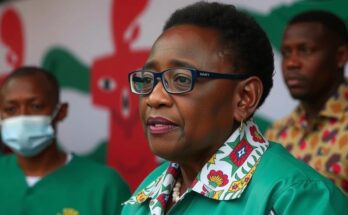Senegal’s ruling party, PASTEF, has claimed a decisive victory in the legislative elections, allowing President Bassirou Diomaye Faye to advance his reform agenda. Despite some opposition concessions, allegations of electoral fraud have emerged. The country faces high unemployment and fiscal challenges, complicating the government’s efforts to implement change effectively.
Senegal’s ruling party has asserted its dominance by claiming a decisive victory in the recent legislative elections, following the noteworthy success of President Bassirou Diomaye Faye in the presidential polls earlier this year. With nearly all ballots counted, the PASTEF party emerged as the frontrunner in various polling stations, signaling substantial public support for Faye’s proposed reform agenda. According to government spokesman Amadou Moustapha Ndieck Sarre, this election victory underscores the Senegalese populace’s endorsement of PASTEF’s vision for change. In a display of concession, the leaders of Senegal’s two primary opposition parties acknowledged their electoral defeat. Barthelemy Dias, representing the SAMM Sa Kaddu coalition, publicly congratulated PASTEF, reflecting a spirit of acceptance amidst political rivalry. In contrast, former President Macky Sall, leading the Takku Wallu Senegal grouping from abroad, alleged significant electoral fraud orchestrated by PASTEF, though he did not provide specific instances to substantiate his claims. The recent electoral outcome is pivotal for President Faye, who seeks to advance his ambitious agenda, stymied previously by a fragmented parliament. His party had held fewer than a third of parliamentary seats, which ultimately hindered progress on key initiatives, including anti-corruption measures and equitable resource distribution. Faye’s prior electoral success had positioned PASTEF favorably for this legislative election, with the party expected to capitalize on its previous momentum. However, challenges within the opposition persist, especially for Sall, who has faced scrutiny for his approach during the lead-up to elections, including his controversial attempts to delay the electoral process. Protests and public dissent characterized this period, amplifying the existing tensions between the ruling party and the opposition. Despite the electoral questions, Senegal currently grapples with significant socio-economic issues, including high unemployment rates exceeding 20%. The government has been criticized for its perceived inadequacies and its focus on historical grievances against former administrations. Concurrently, notable adjustments in socio-economic policies, such as reductions in the costs of essential goods, have drawn both praise and concern regarding fiscal sustainability and budget management.
The legislative elections in Senegal represent a crucial moment in the political landscape, emphasizing the ruling party’s consolidation of power after President Bassirou Diomaye Faye’s earlier victory. Faye’s administration faces scrutiny over its ability to implement promised reforms, particularly in combating corruption and managing natural resources. The opposition, while acknowledging electoral defeat, has raised concerns about alleged electoral malpractice, which reflects ongoing political tensions in Senegal’s electoral and governance frameworks. The country’s socio-economic challenges further complicate Faye’s ambitious agenda, highlighting the urgent need for effective policy implementation amidst public dissatisfaction.
In conclusion, Senegal’s recent legislative elections have reaffirmed the ruling party’s stronghold, enabling President Faye to pursue his reform agenda with greater legislative support. The concession by opposition leaders suggests a willingness to engage within the political framework, despite claims of electoral fraud by Former President Sall. As Faye’s government navigates pressing socio-economic challenges, its ability to deliver on promises will be critical for maintaining public trust and addressing the nation’s significant unemployment rates.
Original Source: www.dw.com




